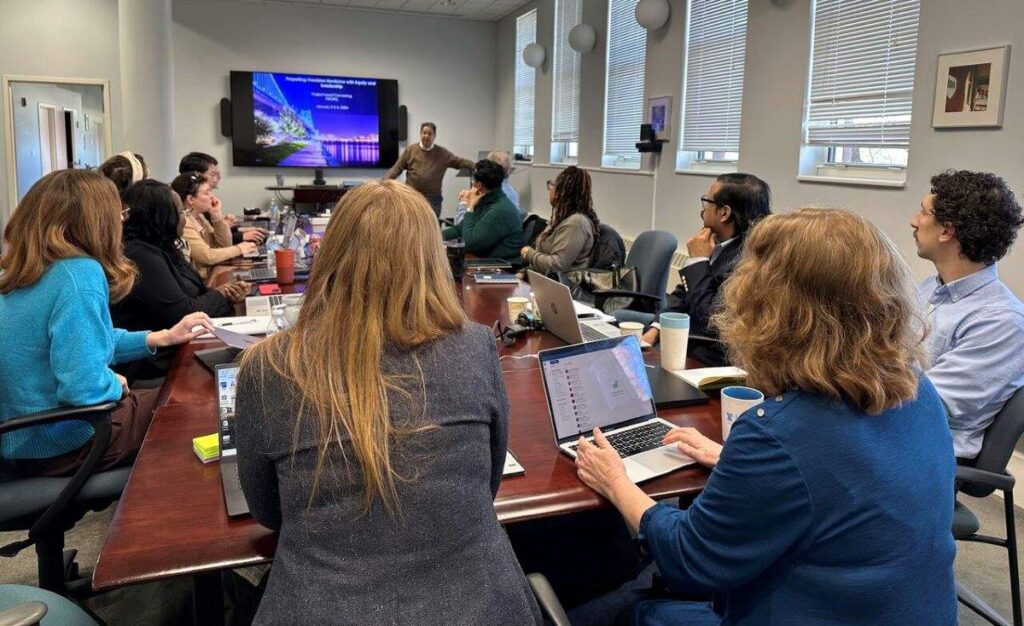Ben Franklin Technology Partners of southeastern Pennsylvania met with numerous stakeholders, including the state of Delaware, to vet proposals for a share of $500 million in federal funding. Photo by PROPEL
WILMINGTON — The Southeastern Pennsylvania region and its partners, including the state of Delaware, have unsuccessfully bid to win $504 million in federal funding as part of the U.S. Economic Development Administration's Technology Hub Initiative.
Delaware is one of three states In bidding for the PROPEL Tech Hub, It is seeking nearly $80 million in funding to boost the region's importance in precision medicine. The region is one of 30 that competed for a share of federal funding aimed at expanding America's tech production and accelerating innovation.
Federal officials selected 12 proposals from Montana, Indiana, Illinois, Nevada, New York, New Hampshire, South Florida, Ohio, Oklahoma and Wisconsin. Two proposals from Colorado and New Mexico, and South Carolina and Georgia, were partnerships.
Projects selected by federal officials will support the development of lithium batteries, computer chips, quantum computing and personalized medicines, among other things.
The southeastern Pennsylvania region's proposal focused primarily on precision medicine, a growing technology focused on using biological data to accurately diagnose diseases and treatments. The PROPEL Tech Hub proposal aimed to increase the efficiency of bringing such technologies to market and share data across a vast network.
The driving force behind this proposal was Ben Franklin Technology Partners in southeastern Pennsylvania; The region spanned Maryland as well as Delaware, Philadelphia and Camden, New Jersey, and included 70 organizations.
Anthony Green, chief scientific officer at Ben Franklin Technology Partners, said that while this wasn't the news he and others were hoping for, he was still “very proud” of the unprecedented collaboration between the partners.
“We know our partners share the same goal and vision for the region's future: accelerating cutting-edge drug development and manufacturing, building pathways to skilled jobs and expanding access to life-changing health care,” Green said.
Delaware has been a hotbed of personalized medicine development in recent years, with ChristianaCare's Helen F. Graham Cancer Center and Research Institute leading the way in research and implementation to date, and the public-private partnership National Institute for Innovation in Biopharmaceutical Manufacturing (NIIMBL) a national leader in improving efficient manufacturing methods and developing the workforce.
Delaware Biosciences Association President and CEO Michael Fleming told the Delaware Business Times that he was disappointed that PROPEL did not receive funding, but he considered getting the state this far a win for Delaware's profile in the field.
“Being recognized as a finalist is a tremendous achievement that demonstrates the strength of our region's precision medicine and broader life sciences capabilities and talent,” said Fleming. “This effort has created unprecedented regional collaboration that will be a tremendous asset in driving industry growth and opportunity, and patient value in the years to come.”
Innovation Space President and CEO Bill Provine served on the PROPEL Steering Committee and helped guide the entrepreneurial projects associated with the proposal. He echoed others in saying the team was proud of the work it did, working with partner organizations and institutions in the Greater Philadelphia region. Provine noted that Delaware already has a strong track record in biosciences, with the Innovation Space serving as a temporary home base for a number of companies, including Prelude Therapeutics and the fast-growing TheraGy Pharma.
“Collaboration is at the heart of success and we are committed to leveraging what we have built through PROPEL for the benefit of society at large,” Provine told DBT. [federal] The program's primary objective is to promote and accelerate the growth of technology hubs in various locations, unlocking better job opportunities in those locations and strengthening the overall economy. … The Greater Philadelphia region is already a national leader in therapeutics and precision medicine, and this strength may have been its greatest weakness in the selection process.”
He also congratulated the 12 technology hubs that received federal funding and expressed excitement about the prospects for future funding opportunities.

